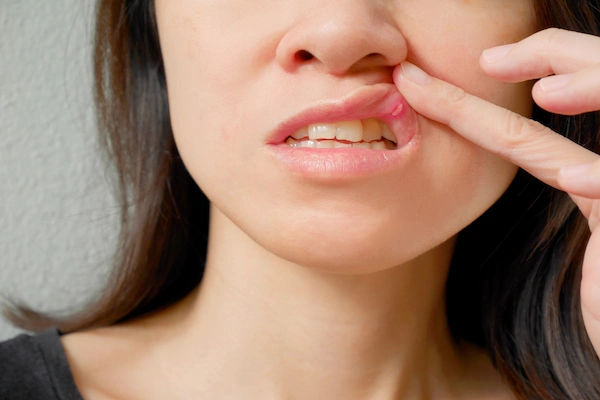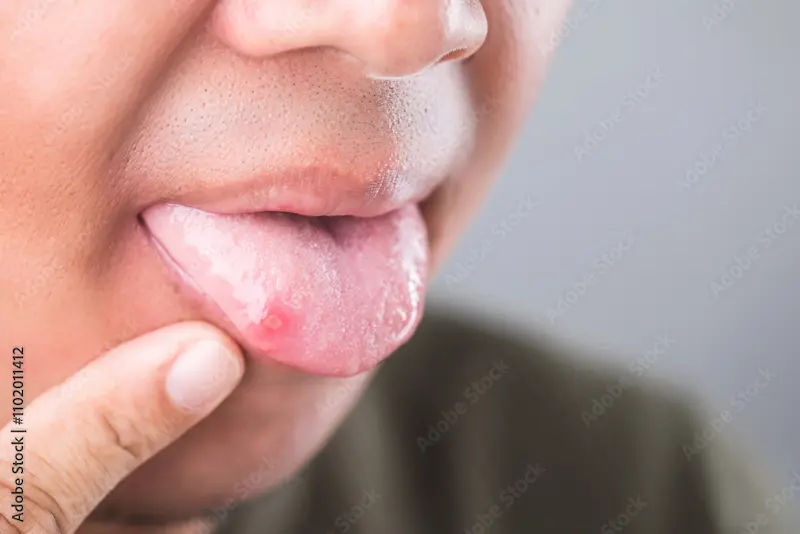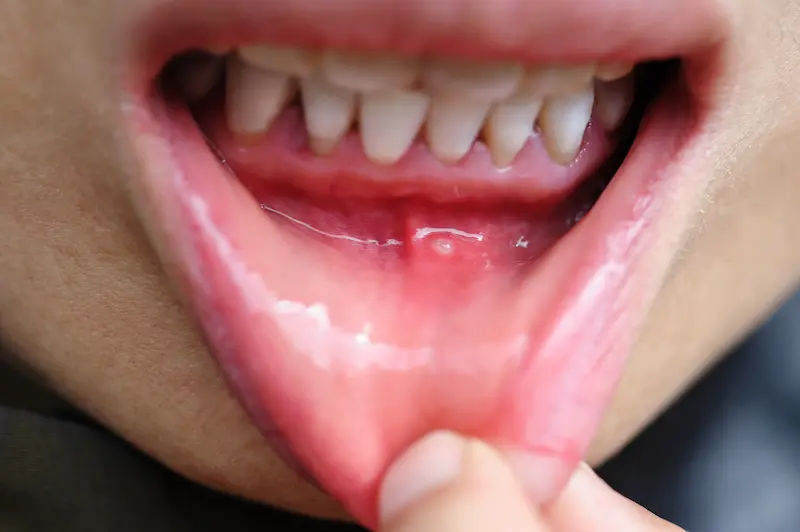Mouth Ulcers: Causes and Prevention
Mouth ulcers are the common diseases that can be prevented. So, know the reasons, and treatment for this disease.

Written by Dr Sonia Bhatt
Last updated on 13th Jan, 2026
Mouth ulcers or canker sores, as they are often called, are small yet extremely painful lesions that develop within the mouth. This condition makes daily activities like eating, drinking and speaking very difficult. Mouth ulcers can happen for several reasons, such as stress and an unhealthy diet, and they disappear on their own. However, several quick outbreaks can gravely impact the quality of life. Thus, it is necessary to understand the causes and treatment of this disease in order to get timely prevention.
Types of Mouth Ulcers
There are different types of mouth ulcers, including –
- Canker Sores: Canker sores are the most common type of mouth ulcers. Doctors are not sure about the actual causes of this ulcer. However, some common causes include acidic foods, stress, and minor trauma. Generally, they are yellow or white with red edges.
- Cold Sores: Cold sores are common viral infections that are also known as fever blisters. These tiny, fluid-filled blisters appear around the lips when individuals suffer from colds and fevers. They appear as a group or patches. Generally, they disappear within 2 to 3 weeks without creating severe issues.
- Traumatic Ulcers: This ulcer happens when the oral cavities degrade with repeated mechanical stress, such as biting with broken or sharp teeth or friction from dental appliances. Most commonly it affects the buccal mucosa, lips, tongue.
Common Causes of Mouth Ulcers
Understanding the causes behind ulcers is crucial for effective prevention and management. So, some of the common causes of mouth ulcers are –
- Nutritional Deficiencies: Mouth ulcers can be caused by deficiencies in certain nutrients, such as vitamin B12, vitamin B9 (folate), iron, and zinc.
- Stress and Hormonal Changes: Hormonal changes during pregnancy or menstruation and emotional stresses are other reasons for mouth ulcers.
- Food Sensitivities and Allergies: Other vital reasons are sensitivity to acidic foods such as citrus fruits, coffee, strawberries, pineapple, and chocolate and an allergic response to oral bacteria.
- Infections: Viral, fungal, or bacterial infections of the mouth, hands, and feet can cause this disease.
Risk Factors
Some of the leading risk factors of this disease include –
- Genetic predispositions include autoimmune diseases such as lupus, Behcet's disease (a rare disease that causes inflammation within blood vessels), and oral lichen planus.
- Underlying health conditions such as HIV and inflammatory bowel disease (IBD).
- Eating spicy, salty, acidic, and crunchy foods such as toast.
- Using a toothpaste with sodium lauryl sulphate.
Symptoms and Diagnosis
The leading symptoms of mouth ulcers include –
- Painful sores with red, white, or yellow
- Red areas around the sores
- Sores on the tongue, lips, or inside the cheeks
A medical appointment is only required to deal with mouth ulcers when individuals encounter the following conditions –
- Unusual and large mouth ulcers
- Painless sores
- Sores that stay longer than 3 weeks
- Appearance of new mouth ulcer before healing the old one
- Severe problems related to eating and drinking
- Extended sores to the lips
- Pains that remain unmanaged by over-the-counter medications or natural remedies
- Diarrhoea or high fever while mouth ulcer appears
Consult Top General Gastroenterologist
Prevention Strategies
Individuals should adopt the following prevention strategies to stop mouth ulcers at their initial stage. Here are some suggestions –
- Avoid foods irritating the mouth; eat non-acidic fruits, vegetables, and whole grains instead.
- Maintaining healthy oral hygiene with regular brushing and flossing is mandatory.
- It's recommended to avoid mouthwashes with sodium lauryl sulphate (SLS) or alcohol and hard-bristled toothbrushes.
- Not to talk while chewing the food to avoid accidental bites.
- Ask the dentists for wax coverage in case someone has orthodontic or dental mouth devices with sharp edges.
- Stress management is mandatory for preventing mouth ulcers. Thus, patients require enough sleep and rest.
- These are not only helpful for managing mouth ulcers, but also for reducing other health issues.
- Go for regular dental cleaning and check-ups.
Home Remedies and Treatments
Mouth ulcers can be cured with both over-the-counter medications and home remedies. OTC medication includes antiseptic gels, such as Anbesol or Orajel, and steroid ointments, such as triamcinolone. In severe cases, doctors might suggest immunosuppressants.
The most common type of mouth ulcer is the canker sore. The natural remedies and lifestyle changes for mouth ulcers include –
- Rinsing the mouth with salt water
- Coconut oil contains lauric acid, which further provides antimicrobial properties. Thus, it prevents the bacteria that cause mouth ulcers
- Milk of magnesia includes magnesium hydroxide. This compound helps to reduce pain and irritation
- Mouth ulcers may result from a weak immune system. Zink can improve immune power, so zinc lozenges can be helpful for mouth ulcers
- Other home remedies include - vitamin B complex supplements, watermelon frosts, hydrogen peroxide, and more.
Complications and When to See a Doctor
- Potential complications of untreated ulcers include oral cancer, dental infections, cellulitis of the mouth (caused by a secondary bacterial infection), and other contagious disorders.
- Indicators for professional help
Conclusion
Mouth ulcers, even though small, can cause significant discomfort and disrupt the daily life of the affected individuals. Even though mouth ulcers disappear on their own, if they don’t, they often indicate an underlying health condition. Therefore, understanding their types, causes, and risk factors can help individuals get the right treatment. Also, knowing the preventive measures can help people stop these blisters in the first stage, prevent complications, and ensure better oral health.
Consult Top General Gastroenterologist
Consult Top General Gastroenterologist

Dr. Ankit Vijay Agarwal
Gastroenterology/gi Medicine Specialist
14 Years • MBBS(Osmania), DNB(Internal Medicine ), DM ( Osmania) Consultant Gastroenterologist, Hepatologist and Advanced Therapeutic Endoscopist
Hyderabad
Apollo Hospitals Jubilee Hills, Hyderabad

Dr Piyush Vishwakarma
Gastroenterology/gi Medicine Specialist
11 Years • MBBS, MD, DrNB,
Delhi
Apollo Hospitals Indraprastha, Delhi

Dr Bhargav Vuppumalla
General Physician/ Internal Medicine Specialist
5 Years • MBBS MD GENERAL MEDICINE
Bengaluru
Apollo Medical Center, Marathahalli, Bengaluru

Dr. Jatin Yegurla
Gastroenterology/gi Medicine Specialist
11 Years • MD (PGI), DM (AIIMS Delhi), FAGIE (AIIMS Delhi), ESEGH (UK), Gold Medalist
Hyderabad
Apollo Hospitals Jubilee Hills, Hyderabad
(675+ Patients)

Dr. Shivaraj Afzalpurkar
Gastroenterology/gi Medicine Specialist
13 Years • MBBS, MD General medicine (Gold medalist), DrNB (Gastroenterology), MNAMS
Bengaluru
Apollo Clinic, JP nagar, Bengaluru
Consult Top General Gastroenterologist

Dr. Ankit Vijay Agarwal
Gastroenterology/gi Medicine Specialist
14 Years • MBBS(Osmania), DNB(Internal Medicine ), DM ( Osmania) Consultant Gastroenterologist, Hepatologist and Advanced Therapeutic Endoscopist
Hyderabad
Apollo Hospitals Jubilee Hills, Hyderabad

Dr Piyush Vishwakarma
Gastroenterology/gi Medicine Specialist
11 Years • MBBS, MD, DrNB,
Delhi
Apollo Hospitals Indraprastha, Delhi

Dr Bhargav Vuppumalla
General Physician/ Internal Medicine Specialist
5 Years • MBBS MD GENERAL MEDICINE
Bengaluru
Apollo Medical Center, Marathahalli, Bengaluru

Dr. Jatin Yegurla
Gastroenterology/gi Medicine Specialist
11 Years • MD (PGI), DM (AIIMS Delhi), FAGIE (AIIMS Delhi), ESEGH (UK), Gold Medalist
Hyderabad
Apollo Hospitals Jubilee Hills, Hyderabad
(675+ Patients)

Dr. Shivaraj Afzalpurkar
Gastroenterology/gi Medicine Specialist
13 Years • MBBS, MD General medicine (Gold medalist), DrNB (Gastroenterology), MNAMS
Bengaluru
Apollo Clinic, JP nagar, Bengaluru




